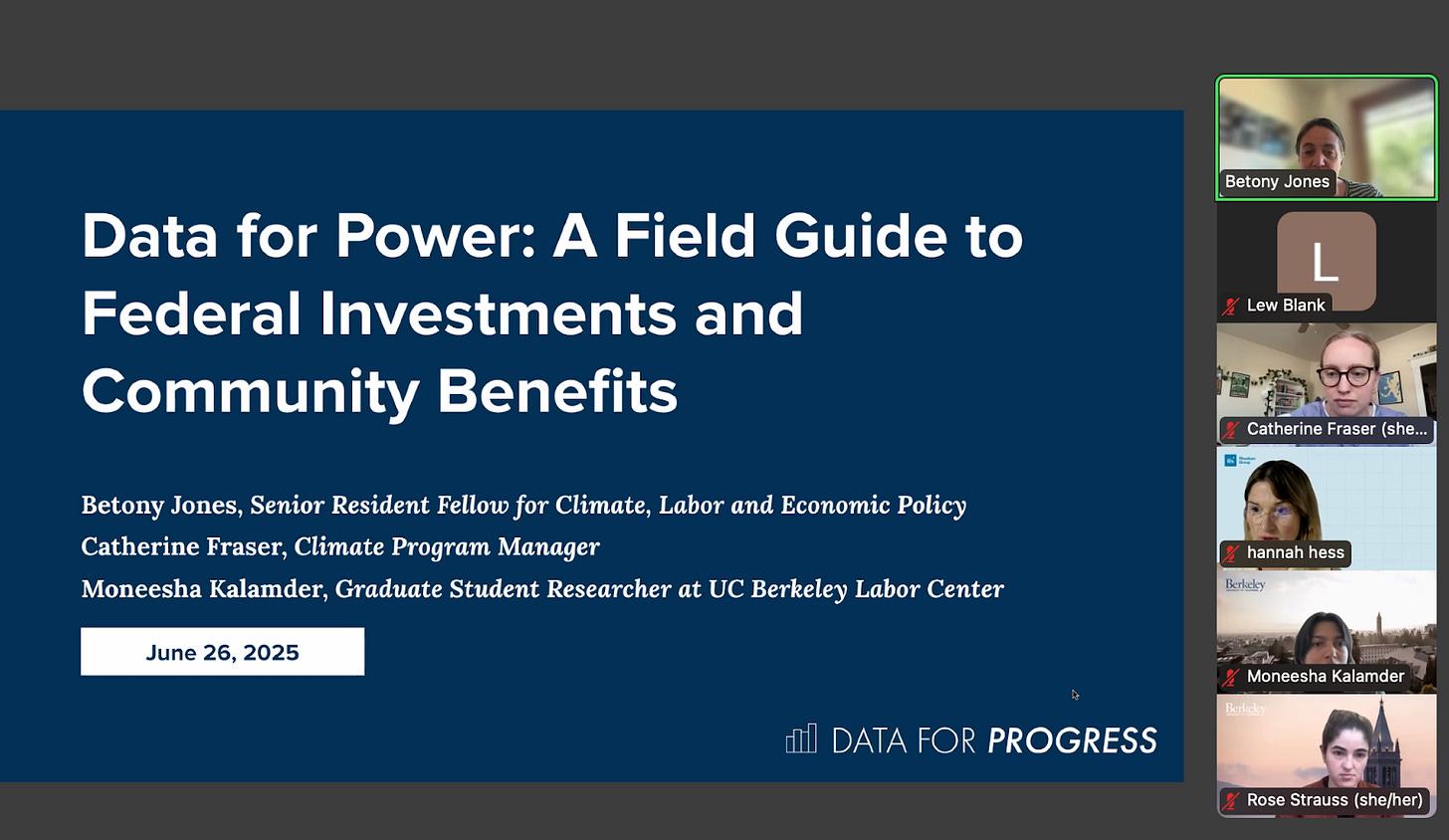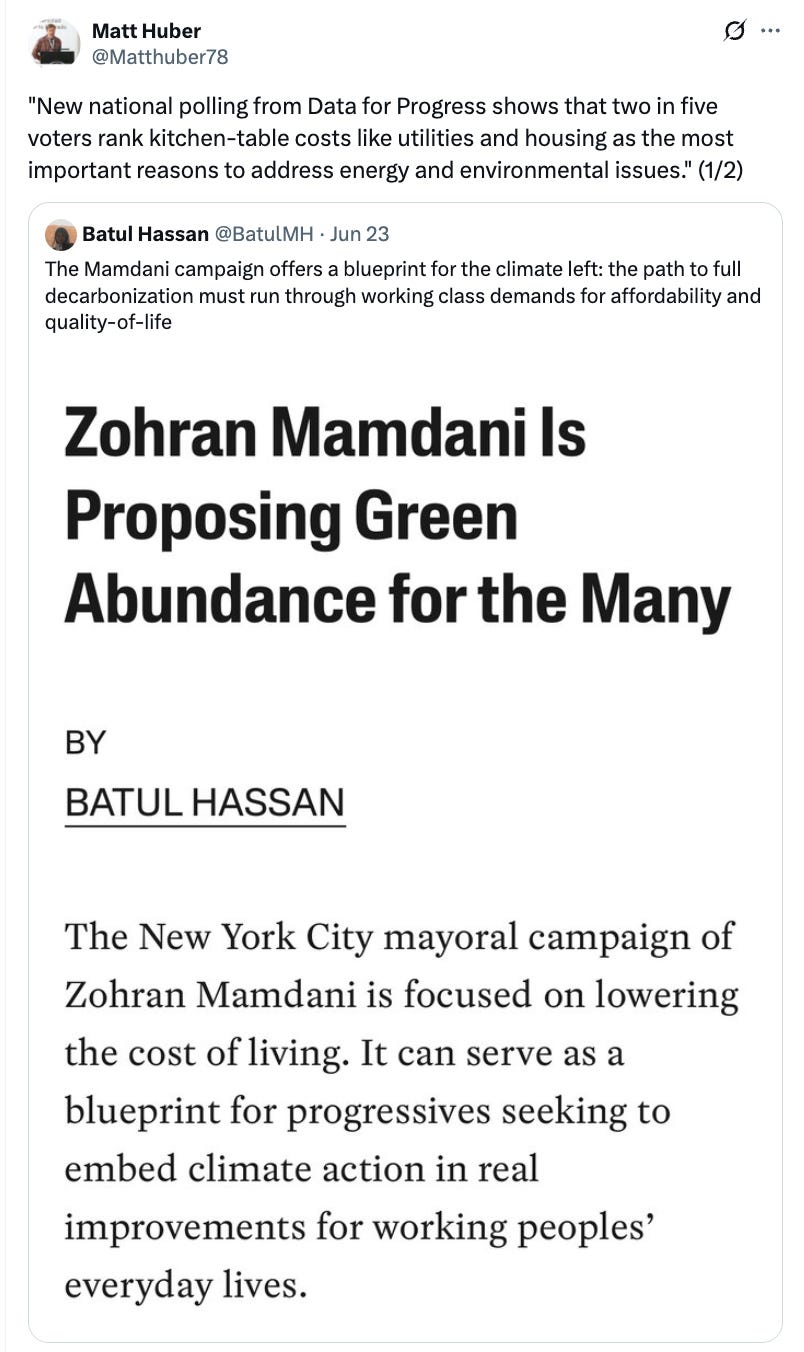One Big Bill to Break Everything as We Know It
Welcome back to Data for Climate Progress — your one-stop shop for all things climate at Data for Progress.
Welcome back to Data for Climate Progress — your one-stop shop for all things climate at Data for Progress. Catch us here every month for our latest climate polling, juicy insights, and can’t-miss reading lists.
As always, we’d love to hear from you — drop us (Grace Adcox and Catherine Fraser) a line at gracea@dataforprogress.org and catherine@dataforprogress.org. Forwarded this email? You can subscribe below.
Meet Elias!
Hi everyone! My name is Elias Kemp (he/him), and since early June, I’ve had the incredible opportunity to work as a climate and energy program intern here at Data for Progress. I’m a rising junior at Colby College, in Maine, where I’m pursuing a major in philosophy and a minor in environmental studies. Whenever I’m not holed up in the library, I work as an editor for Colby’s student newspaper, explore off-campus with Run Club, and play the drums in two student bands.
At DFP, I draft surveys, write briefs, and conduct research alongside the other members of the climate team to forward progressive climate policy. I have spent most of my life in the Intermountain West, and I currently live in northern Colorado, so my areas of interest include the wilderness, water rights, and wildfire management, to name just a few. Later this summer, I’m excited to write and field my own survey on these subjects.
Looking to the future, I intend to pursue a career in environmental law. Both here at DFP and in my work after graduating from college, I aspire to advocate for the health of our planet and its many inhabitants, especially by creating and stewarding policies that guide our interactions with the climate and the natural world.
If you have any questions about my work, or if you’re wondering where to hike in Rocky Mountain National Park, feel free to send an email to elias@dataforprogress.org.
Meet Brynne!
Hello! I’m Brynne Robbins (she/her), and I’m so excited to be joining Data for Progress as a climate and energy program intern this summer. I’m headed into my final year at Colby College, where I’m double majoring in government and environmental policy, with a minor in music. I compete on the cross country and track teams, and I can often be found in the pottery studio, the arboretum, or playing traditional fiddle music.
Growing up in rural Maine, I’ve witnessed the impacts of climate change on the place I love, and it has been one of my biggest motivators to pursue a career in environmental law. My work in the environmental sphere so far has spanned monitoring for and removing invasive aquatic plants, conducting field research on common loons, contributing to marine policy research on campus as an undergraduate research assistant, and working on the advocacy team at the Natural Resources Council of Maine.
At Data for Progress, I work with the climate team to help to draft polls, conduct research, and write for the website and newsletter. I’m eager to learn more about policy development and the world of public opinion research. I’m also excited to undertake my own research project later this summer, which will explore the potential for clean energy development to increase community resilience to extreme weather events.
I’d love to hear from you, whether it’s about a polling question, running, or your favorite spots in Washington, D.C. You can reach me at brynne@dataforprogress.org!
Thom Tillis Must Have Seen This …
In Heatmap News, we find that by a +13-point margin, North Carolina voters want the Inflation Reduction Act (IRA) to be kept in place, not repealed. This includes 71% of Democrats and 50% of Independents. Hours after announcing he’d forgo a reelection bid, Sen. Thom Tillis took to the Senate floor to bash his own party’s reconciliation bill. We think it was this poll — and definitely not the bill’s outrageous, industry-killing excise tax on solar and wind, or the more than 660,000 North Carolinians who’d lose Medicaid if it passes — that pushed him over the edge. Wow, it’s bleak out there. Drink some water, everyone.
Voters Want Government Loans for New Clean Tech
The Department of Energy’s (DOE) Loan Programs Office (LPO) has been driving American energy innovation for two decades, by investing in new domestic energy and manufacturing projects like solar, nuclear power plants, and battery manufacturing. And voters see the vision: 61% of likely voters want government-funded loans for renewable energy development. Despite this, lawmakers are considering rescinding LPO funding for FY2026 due to DOE budget cuts — but they’re out of touch with voters. Fifty-eight percent of all likely voters want to keep this funding in place. Read the brief here.
EPA Mercury Regulations Are in Retrograde, and Voters Aren’t Thrilled
Earlier this month, the Environmental Protection Agency (EPA) released plans to roll back limits on how much mercury, carbon dioxide (CO2), and other pollutants power plants can emit. We asked voters what they thought, and nearly three-quarters (74%) are concerned about the EPA’s rollback — understandable, given how bad mercury is for your health. Sixty-nine percent of voters support keeping the current mercury limits, and 66% support current rules that limit CO2 emissions. Only about 1 in 5 voters think the mercury (19%) and CO2 (22%) regulations should be repealed. Read the brief here.
Voters Are Experiencing Climate-Related Wallet Woes
Earlier this month, we ran a survey to figure out whether voters are worried about the financial impacts of climate change. With 62% of Americans living paycheck to paycheck, it should surprise few of our readers that they are. A majority of voters already report that they’re paying more for groceries (77%) and electricity (60%) year over year. A majority of voters (58%) are most concerned about having to pay more for food as climate change worsens, and a similar percentage of voters think climate change will have a direct financial impact on them and their families. Read the brief here.
Data Is a Tool – Its Value Is in How We Use It
On June 26, Data for Progress’ Betony Jones and Catherine Fraser hosted a webinar, along with UC Berkeley’s Moneesha Kalamder and Rose Strauss, Rhodium Group’s Hannah Hess, and Atlas Public Policy’s Tom Taylor, to commemorate the launch of DFP’s new Data for Power resource guide and data repository.
In the waning days of the Biden administration, DFP embarked on a massive project to download resources and datasets that catalog the climate and energy investments made during that administration and as a result of the Inflation Reduction Act (IRA), Bipartisan Infrastructure Law (BIL), and CHIPS and Science Act (CHIPS). This repository – intended to be used by organizers, policymakers, researchers, and other stakeholders – summarizes and makes available all the resources and datasets downloaded and archived by Data for Progress.
In the guide, we’ve also included tips for organizers and researchers on how the data can be used to drive community benefits.
Betony Jones sums up the values of these resources in a new Insights piece:
Going forward, we will continue to support state policymakers, researchers, advocates, and organizers in navigating these resources to support the critical work on the ground. These maps and data are tools not to commemorate a once-in-a-lifetime influx of investment, but to ensure that BIL and IRA are the catalysts of a durable clean energy transition, transformative industrial strategy, and a new American economy.
You can find a recording of the webinar here and our slide deck here.
Voters Are Hot and Bothered About Cuts at NOAA and FEMA
By Elias Kemp and Brynne Robbins
Atlantic hurricane season began on June 1, and while there has only been one named storm so far, experts predict there are anywhere between 12 and 18 more on the way. The South is still grappling with the fallout of last year’s Hurricane Helene, the deadliest hurricane to hit the U.S. mainland since Katrina. Meanwhile, wildfire season is fast approaching, and a record-setting heat wave blanketed the country east of the Rockies in late June.
While most people across the U.S. are bracing for the 2025 disaster season, the White House is doing the opposite. The National Oceanic and Atmospheric Administration (NOAA), whose work is critical for extreme weather forecasting, and the Federal Emergency Management Agency (FEMA), which provides aid in the aftermath of disasters, have both been targeted by budget and staffing cuts. NOAA may see 40% of its budget slashed, and the Trump administration plans to phase out FEMA entirely at the end of hurricane season.
To gauge national opinion on the cuts at NOAA and FEMA, Data for Progress conducted a survey of 1,166 likely voters. Regardless of party affiliation, voters are strongly opposed to Trump’s recent cost-cutting decisions.
When provided with one-sentence descriptions of both federal agencies, voters strongly support maintaining or increasing the funding allocated to NOAA and FEMA. Around 4 in 5 voters (79%) say funding for NOAA should stay the same or increase, including 85% of Democrats, 77% of Independents, and 75% of Republicans. Almost the same number of voters (80%) believe FEMA funding should stay the same or increase, including 88% of Democrats, 76% of Independents, and 75% of Republicans. Less than a tenth of voters want to see NOAA (6%) or FEMA (9%) funding reduced.
When asked to indicate their top two concerns about the impacts of staffing and budget cuts at NOAA and FEMA, voters say they are worried about there being insufficient resources for state emergency management planning (27%), slower emergency response times (25%), and an inability for their communities to recover financially from extreme weather events (25%).
The data indicates that voters oppose Trump’s recent and ongoing cuts at NOAA and FEMA. It remains to be seen what the effects of those cuts will be during the 2025 disaster season, which promises to be bad enough even if these two federal agencies were operating at pre-Trump capacity. Check out the full brief here.
“Zohran Mamdani Is Proposing Green Abundance for the Many,” by Batul Hassan (Jacobin)
“Last Call at the Disaster Department,” by Zoë Schlanger (The Atlantic)
“The Long, Slow Death of ‘Development,’” by Holly Jean Buck (Compact)
“To Get Abundance, We Need to Discipline Capital,” by Brian Callaci (Jacobin)


















